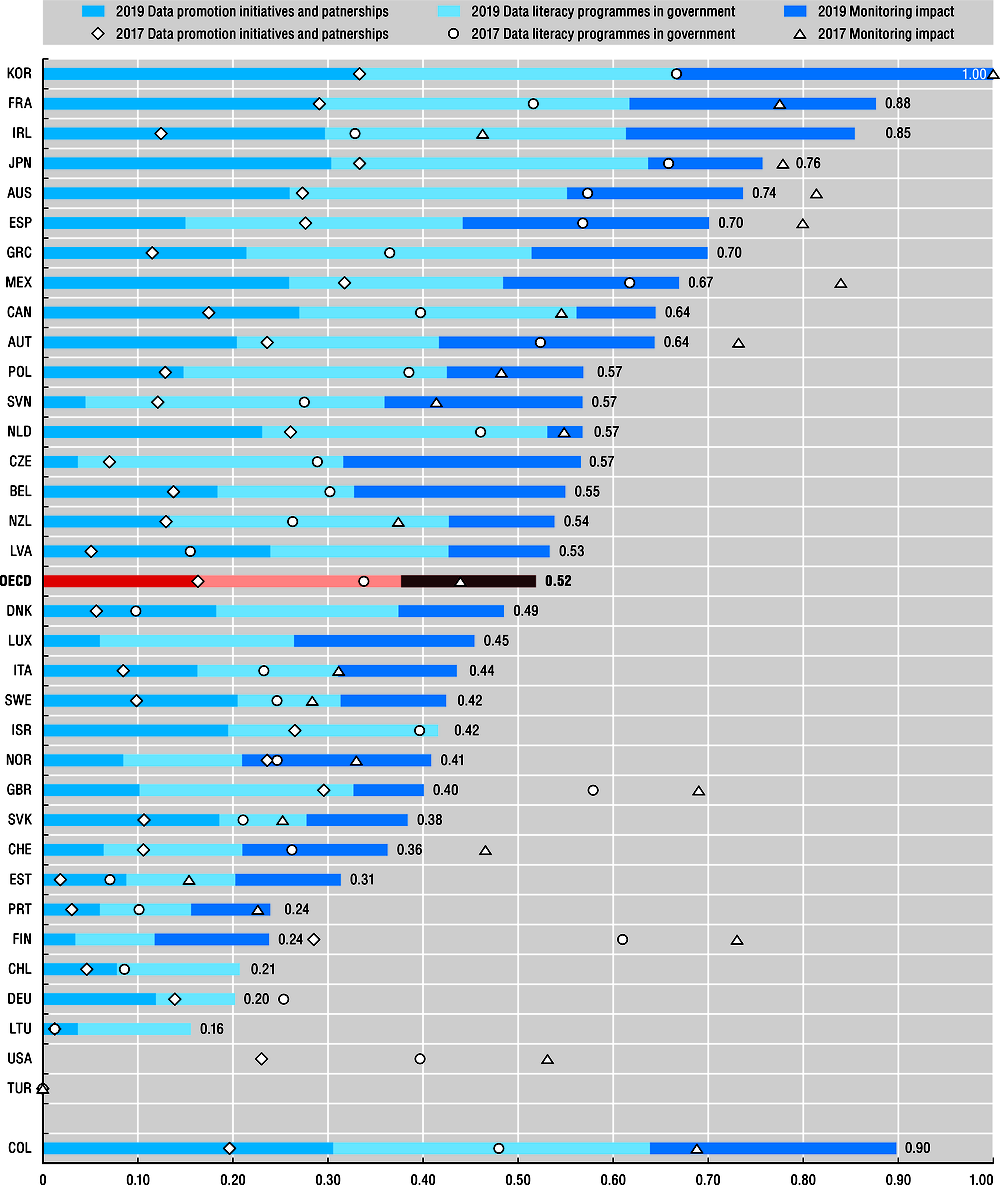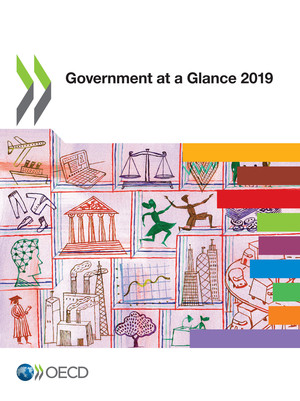copy the linklink copied! Engaging users: Promoting awareness and re-use of open government data
Promoting, collecting and presenting successful cases of government data re-use that have had an impact on social and economic well-being is essential to unlocking the full potential of open government data (OGD). As data providers, governments play a key role in raising awareness and promoting greater re-use, both within and outside the public sector. For such purpose, they can enhance capacities and skills inside the public administration, along with organising events, competitions, programmes and partnerships that stimulate the data re-use among external stakeholders. Monitoring social and economic impacts of OGD is also key.
The indicator governments support for data re-use has three sub-indicators: data promotion initiatives and partnerships; data literacy programmes in government; and monitoring impact, each one scoring a maximum of 0.33 points. The OECD average has increased from 0.44 in 2017 to 0.52 in 2019 (out of a minimum of 0.00 and maximum of 1.00 points). Improvements across OECD countries are largely due to investments in open data programs and events that target public servants, as well as increasing efforts to monitor impacts of OGD through research and by displaying re-use examples on central OGD portals.
Korea remains as the leader in this domain, scoring the highest value for all three sub-indicators. Despite overall enhanced support for re-use, some countries perform less well. The score for data promotion decreased in Norway and Finland, from 0.24 in 2017 to 0.08 in 2019 and from 0.29 to 0.03 respectively, because they organised fewer events to involve civil society and businesses than in 2017.
The support for OGD re-use among external stakeholders has generally remained constant between 2017 and 2019; the OECD average for data promotion remains at 0.16 (out of 0.33). However, countries that have kept open government data high on the political agenda in recent years, including Ireland and Latvia, have organised activities and programmes that aim to support re-use among businesses and civil society (e.g. hackathons, open data conferences and co-creation events).
As noted earlier, a majority of countries have devoted resources to building open data skills and capabilities within their respective public administration. The OECD average for the sub-indicator data literacy programmes in governments increased from 0.17 to 0.21. For example, New Zealand has made considerable progress in training its public servants on the benefits and use of open data, thus moving from 0.13 to 0.29.
In line with the advancement of OGD portals across OECD countries, more of them are seeking to collect and display various kinds of examples of re-use to inspire users. This has led to an increase in the OECD average for the sub-indicator monitoring impact from 0.10 in 2017 to 0.14 in 2019. Some countries have undertaken research to assess the social and economic impact of OGD. Denmark and Latvia have, for instance, investigated the economic effects of open geospatial data.
Government support for data re-use measures the extent to which governments play a proactive role in promoting the re-use of government data inside and outside of government. It covers primarily Principle 5 (“Improved governance and citizen engagement”) and Principle 6 (“Inclusive development and innovation”) of the International Open Data Charter. It consists of three sub-indicators: data promotion initiatives and partnerships; data literacy programmes in government; and monitoring impact. The three sub-indicators have an equal weight of 0.33, as a result, each ranging from 0 to 0.33. The indicator ranges from 0 (minimum) to 1 (maximum). When aggregating to the final OURData Index, the score of government support for data re-use is transformed to range from 0 to 0.33 and with this. it is assigned an equal weight to the other two indicators.
Data for the OURdata Index and the indicator on government support for data re-use are collected through the OECD Open Government Data Survey. Survey respondents were predominantly senior government officials in charge of digital or open government policies. Responses represent countries’ own assessments of current practices and procedures regarding open government data. Data refer only to central/federal governments and exclude practices at the state/local level. The OURdata Index is a composite index based on the International Open Data Charter principles and methodology described in OECD work (Lafortune and Ubaldi, 2018).
For more information on the methodology and underlying data, see Annex E.
Further reading
Lafortune, G. and B. Ubaldi (2018), “OECD 2017 OURdata Index: Methodology and results”, OECD Working Papers on Public Governance, No. 30, OECD Publishing, Paris, https://doi.org/10.1787/2807d3c8-en
OECD (2015), Open Government Data Review of Poland: Unlocking the Value of Government Data, OECD Digital Government Studies, OECD Publishing, Paris, https://doi.org/10.1787/9789264241787-en
Figure notes
Data for 2017 are not available for Hungary, Iceland and Luxembourg. Data for 2019 are not available for Hungary, Iceland, Turkey and the United States. On data for Israel, see https://doi.org/10.1787/888932315602.
Metadata, Legal and Rights
https://doi.org/10.1787/8ccf5c38-en
© OECD 2019
The use of this work, whether digital or print, is governed by the Terms and Conditions to be found at http://www.oecd.org/termsandconditions.



